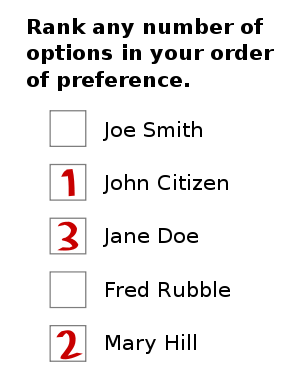Optional Preferential Voting
One of the ways in which ranked voting systems vary is whether an individual vote must express a minimum number of preferences to avoid being considered invalid (spoiled or informal).
Possibilities are:
- Full preferential voting (FPV) requires all candidates to be ranked
- Optional preferential voting (OPV) requires only one candidate, the voter's first preference, to be indicated
- Semi-optional preferential voting requires ranking some number greater than one but less than the total number of candidates.

Ranked-voting systems typically use a ballot paper in which the voter is required to write numbers 1, 2, 3, etc. opposite the name of the candidate who is their first, second, third, etc. preference. In OPV and semi-optional systems, candidates not explicitly ranked by the voter are implicitly ranked lower than all numbered candidates. Some OPV jurisdictions permit a ballot expressing a single preference to use some other mark than the digit '1', such as a cross or tick-mark, opposite the preferred candidate's name, on the basis that the voter's intention is clear; other do not, arguing for example that an 'X' might be an expression of dislike. FPV may not be possible if write-in candidates are allowed.
In a transferable-vote system like the single transferable vote (STV) or instant runoff voting (IRV), a ballot is initially allocated to the first-preference candidate but if the first preference candidate is elected or found to be un-electable, the vote may be transferred one or more times to successively lower preferences. If there is no lower preference available when such a transfer is applicable, the ballot is said to be exhausted.
FPV prevents exhausted ballots. On the other hand, FPV increases the risk of invalid ballots: the more numbers a voter is required to mark, the greater the opportunity for mistakes, by repeating or skipping numbers or skipping candidates. Some Australian elections which mandate FPV have reduced informal (invalid) votes by adding group voting tickets "above the line" on ballot papers: these allow voters to select a complete party list prepared by one of the parties, instead of manually entering personal preferences marked for individual candidates "below the line".
Ranked vote systems vary in that some cast aside, at the start of the vote count, a ballot not correctly filled out but other systems allow a vote even if not fully and correctly marked to be used until the first mistake annuls the ballot. That was the case in federal Australian elections prior to 1998 (a Langer vote) but after 1998 Australia classified those votes as informal (invalid). Australia now allows ballots to express less than complete preferences (optional preferential voting) for Senate elections but still full-preferential voting is used for members of Australia's House of Representatives.
Australia
The terms OPV and FPV are used mainly in Australia, in relation to elections at state and territory and Commonwealth (federal) level, which use proportional representation (Single transferable voting/STV) or preferential voting (IRV).
OPV is used in elections in the Australian state of New South Wales. It was used in Queensland from 1992 to 2015, when it was replaced by full-preferential voting.
OPV was adopted in the Northern Territory in 2016.
In both the Tasmanian House of Assembly and the Tasmanian Legislative Council, semi-optional voting is used, with a minimum number of preferences required to be expressed; but there is no requirement to complete the entire ballot paper. Elections for all other Australian lower houses use full-preferential voting. In the New South Wales Legislative Council, semi-optional preferencing has been used since 1978, with a minimum 10 preferences required for 15 seats before 1991, and 15 preferences for 21 seats since. Voters also have the option since 1984 of voting "above the line". In the Victorian Legislative Council, semi-optional voting is used if a voter chooses to vote below the line. Voting above the line requires only a '1' being placed in one box, and group voting tickets voting has applied since 1988.
The Australian Senate voting reform of 2016 switched from full-preferential voting to optional. A minimum number is specified in the instructions on the ballot paper. Since in the past a single number '1' above the line was valid, that is still a formal vote even though voters are encouraged to number six squares.
Elsewhere
STV Elections in Malta, in the Republic of Ireland, and in Northern Ireland use OPV. The ranked-choice voting system used in Maine, United States, can be considered optional-preferential as voters are allowed to rank just one candidate. The system also allows voters to skip one ranking (e.g. marking a first choice and a third choice, but not a second choice). In that case, the next ranking would be advanced to the next highest ranking, but more than one skip exhausts the ballot.
References
This article uses material from the Wikipedia English article Optional preferential voting, which is released under the Creative Commons Attribution-ShareAlike 3.0 license ("CC BY-SA 3.0"); additional terms may apply (view authors). Content is available under CC BY-SA 4.0 unless otherwise noted. Images, videos and audio are available under their respective licenses.
®Wikipedia is a registered trademark of the Wiki Foundation, Inc. Wiki English (DUHOCTRUNGQUOC.VN) is an independent company and has no affiliation with Wiki Foundation.